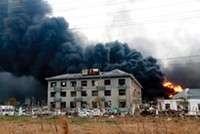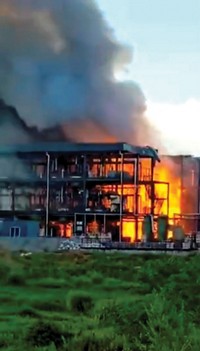Advertisement
Grab your lab coat. Let's get started
Welcome!
Welcome!
Create an account below to get 6 C&EN articles per month, receive newsletters and more - all free.
It seems this is your first time logging in online. Please enter the following information to continue.
As an ACS member you automatically get access to this site. All we need is few more details to create your reading experience.
Not you? Sign in with a different account.
Not you? Sign in with a different account.
ERROR 1
ERROR 1
ERROR 2
ERROR 2
ERROR 2
ERROR 2
ERROR 2
Password and Confirm password must match.
If you have an ACS member number, please enter it here so we can link this account to your membership. (optional)
ERROR 2
ACS values your privacy. By submitting your information, you are gaining access to C&EN and subscribing to our weekly newsletter. We use the information you provide to make your reading experience better, and we will never sell your data to third party members.
Safety
Toll Rises To 114 In Tianjin Port Explosions
Accident Update: Hundreds of tons of sodium cyanide were stored in a warehouse at the center of the blasts
by Jean Francois
August 17, 2015

Chinese authorities have confirmed that at least 114 people have perished in the explosions that occurred in the port of Tianjin on August 12. While the cause of the blasts remains unknown, a military officer commanding a unit working at the site said that several hundred tons of sodium cyanide was stored at the dangerous goods storage facility that exploded.
Several of the casualties identified were firefighters, say official Chinese media reports. On Monday afternoon, 70 people are still missing, 64 of whom are firefighters.
According to the transcript of a government press conference held on Sunday Aug. 16 in Tianjin, hundreds of tons of sodium cyanide were stored at Ruihai Logistics, the company where the explosions occurred. Sodium cyanide is used in the mining industry to extract gold and other precious metals.
Luze Shi, a military commander sent from Beijing, said that sodium cyanide found at the site will be contained, removed if found in intact containers, or treated with hydrogen peroxide to neutralize it. Sodium cyanide releases flammable and toxic hydrogen cyanide gas on contact with acids or water, according to the U.S. Centers for Disease Control and Prevention. Shi commands troops trained in chemical warfare.
Officials from the Supreme People’s Procuratorate, China’s top prosecutorial office, will investigate the explosion in an effort to determine whether Ruihai was operating legally, the agency has said.
Investigators will also assess whether crimes including “abuse of power, dereliction of duty, or favoritism” contributed to the catastrophe. Chinese media has reported that at least one Ruihai shareholder had close links to the Tianjin government.
In statements that appeared somewhat defensive, Tianjin Environmental Protection Bureau says it had deployed hundreds of officers to monitor air and water quality at and near the blast site in the Binhai industrial park. The bureau detected hydrogen cyanide in the air of the park but did not detect it in surrounding areas.
The bureau also detected cyanide exceeding safety standards by more than 10 times in wastewater coming from the Binhai industrial zone. But it said that the public was not at risk because the water could be contained. Levels of air pollution near the Binhai area were comparable to what they are on normal days, it noted.
Several foreign drug and chemical companies operate in Tianjin. So far, none has reported damage to facilities or injuries to staff. For instance PPG, which employs more than 1,000 people at a coatings manufacturing and research facility 3 miles from the explosion area, says none of its workers were hurt and that its site can safely continue operations.




Join the conversation
Contact the reporter
Submit a Letter to the Editor for publication
Engage with us on Twitter